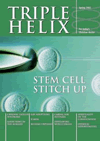Dilly-Dally Dolly
Dolly the cloned sheep has arthritis, further evidence that she is ‘old before her time’. Certainly her telomeres - end-chromosomal DNA fragments which shorten with each cell division - are shorter than would be expected for a sheep of her age. And we do know that cloned animals are ten times more likely to die in utero and three times more likely to die shortly after birth. And yet still the Lords’ Committee on Stem Cell Research remains confident that embryos produced by the ‘Dolly method’ of cell nuclear replacement, hold our best hope for the treatment of degenerative conditions like Parkinson’s disease. Have I missed something here?
Damned if we don’t
A new French law forbids disabled children from seeking damages simply for being born. But parents can still seek compensation if their child’s condition has been missed in prenatal examination through doctor error. Doctors, fearing higher insurance costs, are outraged by the decision which they feel will condemn them for not diagnosing malformations with 100% certainty. And yet the malformations are being sought only to allow the option of abortion. The Hippocratic Oath condemns doctors who kill. But this new law condemns doctors who don’t search and destroy with perfect precision. (BMJ 2001; 323:1384, BMJ 2002; 324:129)
Hope for Superman?
Will research on cloned human embryos really help Christopher Reeve’s quadriplegia? The nervous system is notoriously complicated, and attempts to replace lost cells have so far met with disaster (eg. use of cells from aborted foetuses put into the substantia nigra to treat Parkinson’s disease, resulting in excess dopamine and irreversible side-effects). Superman might look to adult stem cell research - which has shown promise in nerve regeneration in rats, but perhaps he really needs to look towards the creator.
Speciesism?
Sir David Steel was the prime mover for the 1967 Abortion Act and was also, ironically, the parliamentary presiding officer when the Protection of Wild Mammals (Scotland) Bill was recently debated in the Scottish Parliament. The subsequent vote banned fox hunting. Foxes have a gestation of seven to eight weeks, so a baby (born) fox is a little younger than ten weeks, the average gestational age of the180,000 (human) babies aborted each year by doctors in the UK. (Guardian 2002; 13 February)
Misappropriated funds
The latest financial accounts for the high-profile charity Comic Relief show that, in the twelve months to June 2000, £51,953 was paid to abortion provider Marie Stopes for projects in Africa. SPUC national director John Smeaton commented: ‘Anyone with a conscience would not support Comic Relief if they knew their money was being used to kill unborn children’. (Catholic Herald, SPUC News Digest; 8 February).
Chinese clones?
Chinese scientists claimed on 6 March to have cloned ‘dozens’ of human embryos in the last two years. They told the Wall Street Journal they were working to create their own unlimited stem cell line and had already tried producing stem cells by fusing human tissue into a rabbit egg. The aims await independent verification (Metro 2002; 7 March)
Alzheimer’s breakthrough?
A Chicago woman due to develop early onset Alzheimer’s disease has given birth to a baby free of the mutation which causes the affliction. The baby was produced from an embryo after preimplantation genetic diagnosis. Embryos carrying the same ‘defect’ as the mother were discarded (The Times 2002;1, 27 February).
Conjoined conundrum
The mother of twin girls conjoined at the heart, and due to be born in April, has signalled her intention to have them separated. The operation, scheduled to take place at Great Ormond Street in London, will result in the stronger twin Natasha getting the heart. The weaker twin Courtney will die. Tina May, the 23 year old Catholic mother, who refused abortion on religious grounds, is quoted as saying: ‘I am proud of my religion and it is important to me, but I won’t let it become me and my family’s happiness’. If not separated, both babies are likely to live, possibly indefinitely (The Tablet 2002;46, 9 February)
Reproductive complications
Infants conceived with use of intracytoplasmic sperm injection or in vitro fertilization have twice as a high a risk of a major birth defect as naturally conceived infants, according to a Western Australia study. (New England Journal of Medicine 2002;346:725-730, 7 March)
Copycat
The birth of the world’s first successfully cloned cat has been announced by US scientists. The kitten named ‘cc’, the first to be born alive out of 87 cloned cat embryos transplanted into eight cats, was born on 22 December 2001 at Texas University. (Guardian 2002; 15 February)
New role for TV soaps?
TV soaps should show more teenagers getting sexually transmitted diseases (STIs), in order to add a touch of realism to the portrayal of relationships, according to the British Medical Association. STIs, taken together, increased by nearly 300,000 between 1995 and 2000. Vivienne Nathanson, head of Science and Ethics at the BMA blamed the rise on poor sex education in schools, a ‘desperate’ lack of clinics and people not remembering the 1980s Aids campaigns. What about parental responsibility? (The Times 2002;9, 27 February)































